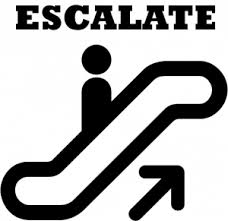记忆方法
将“escalate”分解为“es”和“caleate”。想象一个楼梯(cale,与calesta,意为楼梯,同源)在往上“es”移动,每一步上升表示事态或情况的加剧,因此“escalate”意味着升级或加剧。
以上内容由AI生成, 仅供参考和借鉴
中文词源
escalate 加剧,恶化
e-, 缓音字母。-scala, 梯子,词源同ascend, echelon.比喻义加剧,恶化。
英语词源
- escalate
-
escalate: [20] Escalate is a back-formation from escalator [20], which was originally a tradename for a moving staircase first made in the USA around 1900 by the Otis Elevator Company. This in turn seems to have been coined (probably on the model of elevator) from escalade [16], a term in medieval warfare signifying the scaling of a fortified wall, which came via French and Spanish from medieval Latin scalāre, source of English scale ‘climb’. Escalate originally meant simply ‘ascend on an escalator’; the metaphorical sense ‘increase’ developed at the end of the 1950s.
- escalate (v.)
- 1922, "to use an escalator," back-formation from escalator, replacing earlier verb escalade (1801), from the noun escalade. Escalate came into general use with a figurative sense of "raise" from 1959 (intrans.), originally in reference to scenarios for possible nuclear war. Related: Escalated; escalating. Transitive figurative sense is by 1962.
权威例句
- 1. Costs can escalate terrifyingly.
- 成本的上涨速度会很惊人。
- 2. Ground rents are likely to escalate over time.
- 地租以后可能会逐渐上涨。
- 3. Conditions are still very tense and the fighting could escalate at any time.
- 局势仍然非常紧张,战斗随时可能升级。
- 4. Both unions and management fear the dispute could escalate.
- 工会和管理层都担心争端会恶化。
- 5. Defeat could cause one side or other to escalate the conflict.
- 失败可能会导致其中一方将冲突升级。
